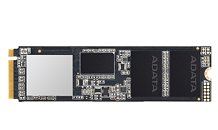Thursday, November 7th 2019

ADATA Launches IM2P33E8 PCIe Gen3x4 M.2 2280 SSD
ADATA Technology, a leading manufacturer of high-performance DRAM modules, NAND Flash products, and mobile accessories is pleased to announce the launch of the ADATA IM2P33E8 PCIe Gen3 x4 M.2 2280 SSD. Designed with 5G networking, cloud computing, AI, and IoT in mind, the SSD sports excellent performance, large storage capacities, wide-temperature resistance (-40°C-85°C), and security features. These capabilities combine to offer an ideal solution for applications such as data centers, surveillance, and transportation.
The IM2P33E8 PCIe Gen3 x4 M.2 2280 SSD is NVMe 1.3-compliant and delivers read/write speeds of up to 3500/3200 GB per second, making it up to six times faster than standard SATA III SSDs. It is equipped with 3D NAND Flash memory and comes with storage capacities ranging from 256 GB to 2 TB. It is available in normal-temperature (0°C to 70°C) and wide-temperature (-40°C to 85°C) variants. For enhanced security, integrity, and durability the IM2P33E8 features E2E (End-to-End) Data Protection and RAID Engine. What's more, the IM2P33E8 utilizes AES and TCG Opal encryption to keep confidential data away from prying eyes.With the purchase of the IM2P33E8, customers qualify to download ADATA's SSD Toolbox. SSD Toolbox allows users to monitor and manage the IM2P33E8, with drive status, wear level, and lifespan information. To safeguard quality, compatibility, and reliability, ADATA uses a rigorous SSD validation process that encompasses functionality testing and reliability validation to ensure its SSDs meet the exacting requirements of industrial applications.
Exact availability of the ADATA IM2P33E8 may vary by region.
The IM2P33E8 PCIe Gen3 x4 M.2 2280 SSD is NVMe 1.3-compliant and delivers read/write speeds of up to 3500/3200 GB per second, making it up to six times faster than standard SATA III SSDs. It is equipped with 3D NAND Flash memory and comes with storage capacities ranging from 256 GB to 2 TB. It is available in normal-temperature (0°C to 70°C) and wide-temperature (-40°C to 85°C) variants. For enhanced security, integrity, and durability the IM2P33E8 features E2E (End-to-End) Data Protection and RAID Engine. What's more, the IM2P33E8 utilizes AES and TCG Opal encryption to keep confidential data away from prying eyes.With the purchase of the IM2P33E8, customers qualify to download ADATA's SSD Toolbox. SSD Toolbox allows users to monitor and manage the IM2P33E8, with drive status, wear level, and lifespan information. To safeguard quality, compatibility, and reliability, ADATA uses a rigorous SSD validation process that encompasses functionality testing and reliability validation to ensure its SSDs meet the exacting requirements of industrial applications.
Exact availability of the ADATA IM2P33E8 may vary by region.

6 Comments on ADATA Launches IM2P33E8 PCIe Gen3x4 M.2 2280 SSD
#1 PRICE - 1TB should be $100 and 2TB should be $200 or less.
#2 Is its speed average or better than average? - cause I don't mind if it's average.
#3 Can I trust that it will work up to 5 years from now? When storage gets cheaper, I'll eventually upgrade both computers and storage so I don't risk an old drive failing.
The only M.2 I'm interested in right now is a 2TB for my laptop to accompany the storage already there.
Intel's 660p is 2TB and less than $200.
You can get far better drives for that price, like Sammy Evo or WD Black....
You are basically not interested in this kind of SSDs and have likely not daily high workloads on the SSDs.
If you check a datasheet and find min. guaranteed P/E Cycle >= 3K then it's basically an industrial Solution.
There are also low cost industrial Solution so you can be sure to get 1000 SSDs with identical specs and not 1000 possible different ones. ;)
For personal use there isn't really the need for high lifetime of the cells.
For most people the "per hour rate costs", to exchange or redo the work lost, for spare time aren't worth the expenses.
(Or people usual think so ;)
You could just use modern File systems and believe the marketing MTBF compared to your usage scenario and be happy with the low cost Solutions (like me) :)
Oh and with the current low cost Intel's you need to live with the problem when cache is used up the speed drops to somewhere HDD level.
Still haven't killed my first 20/40/60 GB Intel SSDs (using them as USB Sticks nowadays) and I did several months of read/write evaluation testing with each.
Some details:
That IM2P33E8 is somewhere mid between as they at least state P/E Cycles. "P/E Cycle up to 3K"
The Intel's low cost won't state them because they are likely only three digits like any other low cost SSD on current 4-bit technology.
You can get better ones from Intel too, just not anywhere near the prices you are wishing for.
4-bit solution on the market now were designed for low cost and aren't anywhere near "guaranteed P/E Cycle >= 3K",
3-bit has at least one Solution with "guaranteed P/E Cycle >= 3K" or selections to be up to 3K and hopefully some more on their way.
There are differences for 2-bit/3-bit like low P/E cycles are produced in smaller nm process and high P/E cycles in bigger nm process so costs are likely always >=x1.5